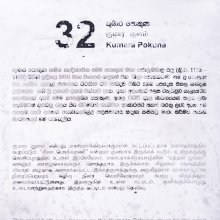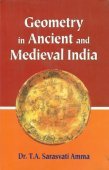Maru: 40 definitions
Introduction:
Maru means something in Buddhism, Pali, Hinduism, Sanskrit, Jainism, Prakrit, the history of ancient India, Marathi, Hindi, biology, Tamil. If you want to know the exact meaning, history, etymology or English translation of this term then check out the descriptions on this page. Add your comment or reference to a book if you want to contribute to this summary article.
Maru has 38 English definitions available.
Images (photo gallery)
Languages of India and abroad
Sanskrit dictionary
[Deutsch Wörterbuch]
Source: Cologne Digital Sanskrit Dictionaries: Böhtlingk and Roth Grosses Petersburger WörterbuchMaru (मरु):—[Uṇādisūtra 1, 7.] m.
1) Wüste, Sandöde [Amarakoṣa 2, 1, 5. 3, 4, 25, 165.] [Hemacandra’s Abhidhānacintāmaṇi 940.] [Anekārthasaṃgraha 2, 446.] [Medinīkoṣa r. 76.] [Halāyudha 2, 3. 5, 52.] adṛśyā gaccha bhīru tvaṃ sarasvati marūnprati [Mahābhārata 13, 7258.] toyamicchāmi yatreṣṭaṃ maruṣvetaddhi durlabham [14, 1599.] marau [1601. 1624.] prāyeṇa nadyo maruṣu satiktāḥ [Suśruta 1, 172, 13.] anūṣaramamaruparihitam [GOBH. 4, 7, 5.] [Raghuvaṃśa 4, 31.] mārga [Spr. 3851.] [KĀM. NĪTIS. 15, 40] (maru zu lesen). marīcikā [Kathāsaritsāgara 4, 134.] marīcayaḥ [25, 9. 57, 91.] jāhnavīmajjanaprītiṃ na jānanti marusthitāḥ [Rājataraṅgiṇī 3, 47. 4, 297.] [Spr. 2774.] —
2) die Kasteiung der Wüste, das Nicht-Trinken: maruṃ sādhayataḥ [Mahābhārata 13, 2939. 6549] (saṃsādhyaṃ st. saṃsevya ed. Bomb.). [Harivaṃśa 1213.] —
3) Berg, Fels [Amarakoṣa 3, 4, 25, 165.] [Hemacandra’s Anekārthasaṃgraha] [Medinīkoṣa] [Halāyudha 5, 52.] prapāta [Mahābhārata 5, 2472.] marutprapatana (sic) [Mārkāṇḍeyapurāṇa 40, 3.] —
4) eine best. Pflanze, = maruvaka [Bhāvaprakāśa im Śabdakalpadruma] —
5) pl. Nomen proprium eines Landes (Marwar) und der Bewohner desselben: maravastu daśerakāḥ (vgl. marubhū, marubhūmi) [Hemacandra’s Abhidhānacintāmaṇi 957.] teṣāṃ marava utkaraḥ [Taittirīyāraṇyaka 5, 1, 1.] marūṃścānumarūṃścaiva śūrābhīrālayāśca ye [Rāmāyaṇa 4, 43, 19.] [Varāhamihira’s Bṛhajjātaka S. 16, 38. 14, 2.] [WASSILJEW 49. 52. 57. 79.] deśa [Scholiast] zu [Kātyāyana’s Śrautasūtrāṇi 436, 13.] Statt murum (so auch die ed. Bomb.) [Mahābhārata 2, 578] wollen [Griechischen und Indoskythischen Könige] [?( Kunde des Morgenlandes 2,
25) und WEBER (Weber’s Indische Studien 5, 152)] marum lesen; vgl. u. [6.] —
6) Nomen proprium eines Daitya (neben naraka wie [Mahābhārata 2, 578]; vgl. u. [5.]) [Mahābhārata 12, 12956] (muru ed. Bomb.). eines Vasu [Harivaṃśa 11538] (dhara die neuere Ausg. und [LANGL.], was richtiger ist). Nomen proprium eines Fürsten, eines Sohnes des Śighra (Śīghraga), [Harivaṃśa 829. fg.] [Rāmāyaṇa 1, 70, 40 (72, 29 Gorresio). 2, 110, 32.] [Viṣṇupurāṇa 387.] [Bhāgavatapurāṇa 9, 12, 5. fgg.] eines Sohnes des Haryaśva [Rāmāyaṇa 1, 71, 9 (73, 8 Gorresio).] [Viṣṇupurāṇa 390.] [Bhāgavatapurāṇa 9, 13, 15. 16.]
--- OR ---
Maru (मरु):—
5) [Bhāgavatapurāṇa 10, 71, 21.] —
6) ein Fürst aus Ikṣvāku’s Geschlecht [Bhāgavatapurāṇa 12, 2, 37.] — Vgl. mṛnmaru .
--- OR ---
Maru (मरु):—
2) [Z. 2 lies] saṃsādhya .
Source: Cologne Digital Sanskrit Dictionaries: Sanskrit-Wörterbuch in kürzerer FassungMaru (मरु):—m. —
1) Wüste , Sandöde. Häufig Pl. —
2) die Kasteiung der Wüste , das Nichttrinken. —
3) Berg , Fels. —
4) eine best. Pflanze [Bhāvaprakāśa 1,229.] —
5) Nomen proprium — a) Pl. eines Volkes. — b) eines Daitya — c) eines Vasu. — d) verschiedener Fürsten.
--- OR ---
Marū (मरू):—Adv. mit bhu zu einer Wüstenei — , zu einer Sandöde werden.
Sanskrit, also spelled संस्कृतम् (saṃskṛtam), is an ancient language of India commonly seen as the grandmother of the Indo-European language family (even English!). Closely allied with Prakrit and Pali, Sanskrit is more exhaustive in both grammar and terms and has the most extensive collection of literature in the world, greatly surpassing its sister-languages Greek and Latin.
See also (Relevant definitions)
Starts with (+644): Maracana, Maravagal, Maru lewa, Maru-kolakural, Maru-kurupay, Maru-manacupatu, Maru-mulpay, Maru-patium, Maru-poruluvamai, Maru-pulipaytal, Maru-purukam, Maru-vittucatanku, Marua, Marua, Marua, Maruaa, Maruabel, Maruadana, Maruadona, Maruaga.
Ends with (+117): Ajumodavomaru, Alakinmaru, Alamaru, Alimaru, Aliyamaru, Alumaru, Amaru, Anumaru, Apatamaru, Bakimaru, Bemaru, Bili-daamaru, Bili-damaru, Bilidaamaru, Cankumaru, Carakkumaru, Carmaru, Cemaru, Cenkumaru, Charmaru.
Full-text (+353): Marudvipa, Marubhu, Marupriya, Marukaccha, Marusthala, Marua, Mrinmaru, Marudesha, Marupatha, Marupavi, Marumahi, Kalamaru, Marupulam, Maru-kurupay, Marutakkal, Marumurai, Marunal, Maruvitu, Kar-marunilam, Maruvorri.
Relevant text
Search found 40 books and stories containing Maru, Maaru, Marū, Mārū, Maṟu, Māru, Māṟu; (plurals include: Marus, Maarus, Marūs, Mārūs, Maṟus, Mārus, Māṟus). You can also click to the full overview containing English textual excerpts. Below are direct links for the most relevant articles:
Tiruvaymoli (Thiruvaimozhi): English translation (by S. Satyamurthi Ayyangar)
Pasuram 3.4.3 < [Section 4 - Fourth Tiruvaymoli (Pukalum nal oruvan)]
Pasuram 6.1.10 < [Section 1 - First Tiruvaymoli (Vaikal pun kalivay)]
Pasuram 6.5.6 < [Section 5 - Fifth Tiruvaymoli (Tuval il ma mani matam)]
Sivaprakasam (Study in Bondage and Liberation) (by N. Veerappan)
Primal Being and the Individual Self < [Chapter 3 - Understanding the Self]
Folk Tales of Gujarat (and Jhaverchand Meghani) (by Vandana P. Soni)
Chapter 23 - Gor Gorani Ni Tikhal < [Part 3 - Kankavati]
Chapter 35 - Vikram and Khapro < [Part 5 - Rang Chee Barot]
The Bhagavata Purana (by G. V. Tagare)
Chapter 12 - The Description of Ikṣvāku’s Race (concluded) < [Book 9 - Ninth Skandha]
Chapter 13 - The Description of the Race of Nimi < [Book 9 - Ninth Skandha]
Chapter 71 - Śrī Kṛṣṇa’s visit to Indraprastha < [Book 10 - Tenth Skandha]
The Brahma Purana (by G. P. Bhatt)
Puranic encyclopaedia (by Vettam Mani)
Related products

